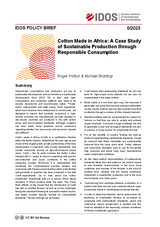Cotton made in Africa: a case study of sustainable production through responsible consumption
Peltzer, Roger / Michael BrüntrupPolicy Brief (6/2023)
Bonn: German Institute of Development and Sustainability (IDOS)
DOI: https://doi.org/10.23661/ipb6.2023
Responsible consumption and production are key to sustainable development, and are therefore a Sustainable Development Goal (SDG 12) in their own right. Consumption and production patterns also need to be socially responsible and economically viable. Private-sector requirements and state supply chain regulations, which have become more widespread in recent years, are designed to ensure that products consumed in high-income countries but manufactured (at least partially) in low-income countries are produced in line with certain social and environmental standards. Although progress has been made, many questions remain, particularly regarding whether the local social and economic impacts are sufficient.
Cotton made in Africa (CmiA) is a certification initiative within the textile industry. Established 18 years ago as part of one of the largest public-private partnerships of German Development Cooperation with private foundations and private companies around an agriculture-based supply chain, CmiA – like its sister scheme the Better Cotton Initiative (BCI) – seeks to ensure compliance with specific environmental and social conditions in the cotton production process. Wherever it is implemented and monitored, the CmiA-standard provides retailers and consumers with the assurance that the cotton in the textiles and garments in question has been produced in line with CmiA-requirements. Up to now, about one million smallholder households with six to seven million family members in Africa produce under the label. This Policy Brief reflects on the impact that the introduction of CmiA has had on certified farmers, as well as on the challenges facing this standard following its successful market launch, and draws broader lessons learned for sustainability standards. The key findings are as follows:
• CmiA shows that sustainability standards do not only work for high-priced niche markets but can also be implemented in the mass market.
• While cotton is a non-food cash crop, the revenues it generates can boost food security among smallholders via the income channel and can also promote local food production through a number of other impact channels.
• Standard-setting must be accompanied by support for farmers so that they are able to comply and activate impact channels. It remains a huge challenge not only to guarantee social and ecological standards but also to achieve a “living income” for smallholder farmers.
• For all the benefits of publicly funding the start-up phase of implementing sustainability standards, it must be ensured that these standards are subsequently financed from the value chain itself. Textile retailers and consumers ultimately have to pay for the goods they consume and which have been manufactured under sustainable conditions.
• As the mass-market implementation of sustainability standards takes time and patience, we cannot expect to see dramatic improvements in the local living conditions and incomes of the farmers in the short to medium term. Instead, this will require continuous investment in smallholder production and in the local environments over many years.
• Transitioning from pesticide-intensive production to a system that does not use such products without major productivity losses is challenging but seems feasible.
• In order to determine whether, and to what extent, the wellbeing of smallholder farmers is increased by complying with sustainability standards, good and continuous impact assessment is needed and this must be adapted to the especially complex conditions of African smallholder agriculture.


